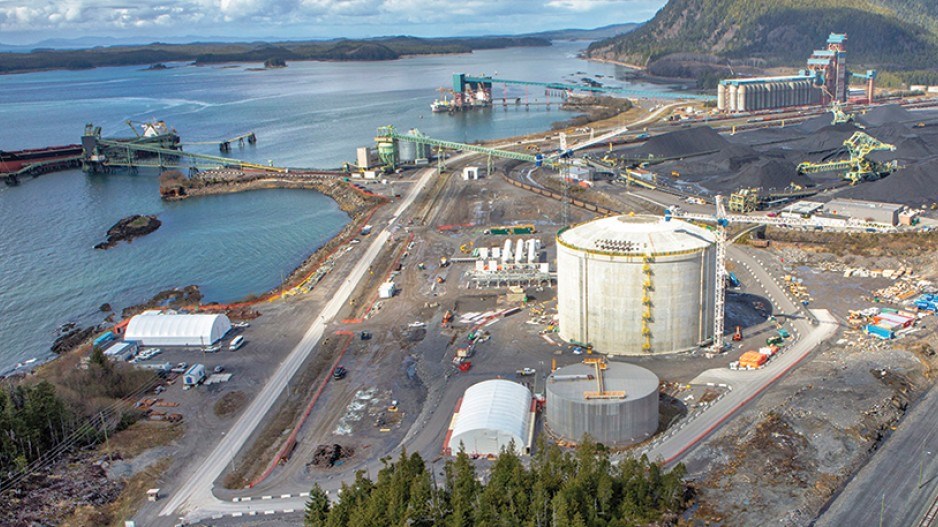The last time oil prices collapsed, major liquefied natural gas (LNG) projects in B.C. and elsewhere were shelved.
Long-term LNG contracts are indexed somewhat to the price of oil, and without guarantees of sufficient long-term pricing, no one pulls the trigger on a multibillion-dollar LNG project.
But for natural gas producers in B.C., the biggest concern now isn’t necessarily the impact of the COVID-19 and low oil prices on natural gas. A bigger concern is the effect on natural gas liquids, like propane and condensate – otherwise known as “wet” gas.
“The consensus seems to be that, so far, we haven’t seen an impact on demand for natural gas,” Tracy Robinson, president of Canadian natural gas pipelines for TC Energy Corp. (TSX:TRP), said April 7 at a two-day virtual energy conference hosted by Scotiabank (TSX:BNS) and the Canadian Association of Petroleum Producers (CAPP).
“I would say that any impact that we do see in the future related to this COVID-19 situation, there’s a short-term response,” Robinson said. “It is not a structural change to demand. So the fundamentals stay strong, and we’re quite optimistic.”
Natural gas liquids are a different story – one that is particularly important for B.C.
The Montney formation in northeastern B.C. and western Alberta is liquids rich. Many of the operators there focus mainly on the liquids, with natural gas being something of a by-product.
Operators in B.C. appear to be holding their own right now, according to companies participating in in last week’s conference. Tourmaline Oil Corp. (TSX:TOU), for example, still has drill rigs operating in B.C. and plans to add more this year.
Drilling would normally slow down this time of year for spring breakup, and the demand for natural gas begins to decline with the approach of summer.
The biggest concern for those companies focused on natural gas liquids is the falling demand for propane in Asia, and the impact of low oil prices on condensate.
A new propane export terminal that AltaGas Ltd. (TSX:ALA) built in Prince Rupert has given producers in B.C. and Alberta access to the Asian market. But demand in Asia has fallen, due to the general contraction of economic activity in response to the CODID-19 pandemic.
“We had hoped that actually we had diversified the whole propane market from Western Canada,” said Darren Gee, president of Peyto Exploration & Development Corp. (TSX:PEY) which is focused on the Deep Basin of Alberta.
“But unfortunately the Far East prices have collapsed so badly, that new export market doesn’t look very attractive, and Edmonton now looks like the most attractive place for propane,” Gee said. “Propane, as a product, doesn’t look great this year.”
As for condensate, prices are directly affected by oil prices. It is used to dilute bitumen. One of the problems with condensate is a lack of storage, which means that there is little capacity for producers to simply store it until prices come back up.
Right now, there is a price differential between oil and condensate of about US$15 per barrel, and oil prices have been down 50% to 60% in recent weeks.
“Right now condensate is the big concern, I think for a lot of natural gas liquids producers,” Gee said.
“With pricing way off, the differentials and the demands for condensate have dropped off. And unfortunately we don’t have any storage in Western Canada really for condensate.
“It’s the one product that we produce a lot of, because of the demand on the heavy oil side, but we really have no storage capability, so any interruptions to demand put us in a real pickle as an industry.
“In the very short-term, it looks like there could be some potential interruptions in demand for condensate, as the heavy oil guys shut in as the result of the pricing.”
Jihad Traya, a natural gas consultant for Solomon Associates, said the longer-term impact on the demand and price for natural gas and natural gas liquids is hard to estimate, because no one knows how long or deep a self-induced global recession will last.
“In the short term right now, you’re kind of insulated,” Traya said. “In the medium to long term, assuming this continues, it’s just as dire, if not more dire, for gas producers.
“They’ve got a place to take their natural gas,” he said. “Once they don’t have a place to take their liquids, their natural gas can’t flow.
“If that natural gas can’t flow, you’ve got to pull it out of storage, which could result in higher prices, and then you’ve got to go start drilling for drier natural gas, which generally has a higher cost.
“There are so many moving parts right now, producers are trying to figure it out. In a lot of ways we are in uncharted territory, as everybody says. I’ve never experienced a situation where global economies contract by up to 30% a quarter – never.”




